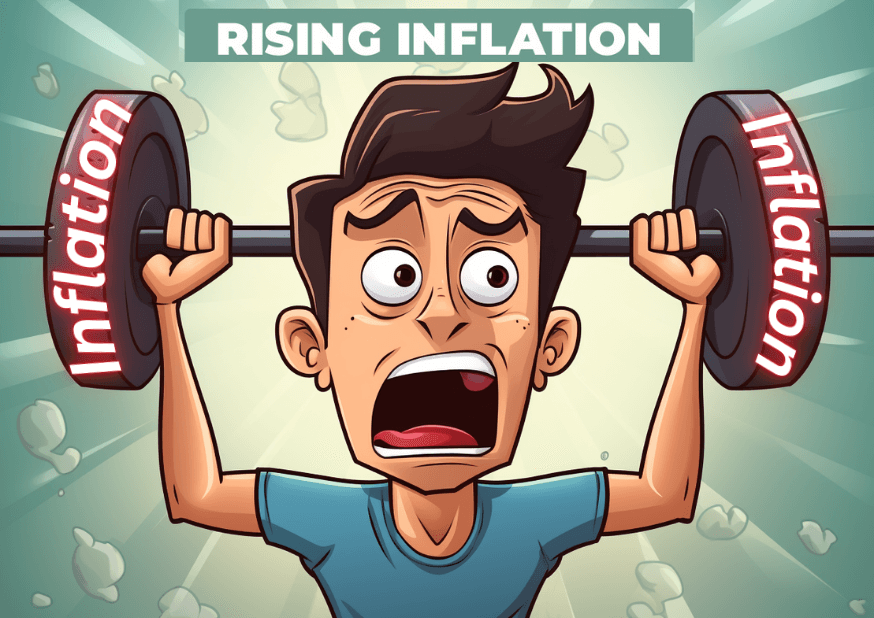- Blogs
- /
- How to Prep for a Recession: 10 Proactive Financial Measures
How to Prep for a Recession: 10 Proactive Financial Measures

Summary
Did you know nearly 60% of Americans have less than $1000 in savings? And with economic uncertainties looming, equipping yourself with the right strategies to weather financial storms becomes crucial.
However, navigating the turbulent waters of recessions requires a compass. This compass must be forged from insights, strategies, and financial resilience.
Remember, knowledge is power. With some planning, you can survive this potential downturn. You might even snag some sweet deals or opportunities.
Today, we’ll delve into actionable tips for fortifying your financial resilience. These include building an emergency fund, reducing non-essential expenses, and diversifying income streams.
By implementing these proactive measures, you can learn how to prepare for a recession and confidently safeguard your finances. You can also navigate economic downturns with ease.
Key Takeaways
- Leading economic indicators are crucial for anticipating recessions. Examples include rising unemployment rates and declining GDP growth.
- Monitoring GDP growth, unemployment rates, and consumer spending patterns provides insights into the economy’s health.
- Recognizing the impact of economic downturns on job security is vital. It allows individuals to assess their employment situation and explore alternative options proactively.
- Knowing about potential housing market downturns during economic uncertainty helps people make informed decisions about real estate investments.
- Building an emergency fund is essential for weathering financial storms. It provides a safety net during tough times.
- Reducing debt burden and making proactive budget adjustments contribute to financial preparedness.
- Calculating net worth involves evaluating assets and liabilities. It offers insights into how a recession might impact one’s financial situation.
- Analyzing expenses helps identify areas for potential wealth accumulation. It also prepares individuals for budget adjustments during economic downturns.
- Reviewing existing debts is crucial for recession preparation. Implementing strategies to reduce high-interest debts is also essential.
- Establishing a systematic savings approach, diversifying savings across asset classes, and reassessing investment portfolios contribute to financial resilience.
Economic Signals

Recession Realities
Understanding leading economic indicators is crucial for preparing for a recession. These indicators provide insights into the economy’s health. They can help individuals and businesses anticipate potential downturns.
For example, rising unemployment rates and declining GDP growth are strong signals that a recession may be on the horizon.
Monitoring GDP growth and unemployment rates allows individuals to gauge the economy’s strength. When GDP growth slows down or contracts, businesses produce less. This could lead to layoffs and reduced consumer spending. Similarly, an increase in unemployment suggests fewer people have jobs. This impacts overall economic stability.
Analyzing consumer spending patterns is also essential as it directly impacts economic activity. During a recession, consumers reduce non-essential purchases, decreasing business revenue. By examining trends in consumer spending, individuals can gain insight into how their financial situation might be affected by changing economic conditions.
Additionally, tracking stock market performance provides valuable information about investor confidence. It also reveals expectations for future corporate earnings. A declining stock market often reflects concerns about the economy’s prospects. It can be an early warning sign of an impending recession.
Preparation Importance
Recognizing the impact on job security is critical when preparing for a recession. During economic downturns, many companies may implement cost-cutting measures.
For example, employers may lay off workers or impose hiring freezes. Being aware of this possibility lets you evaluate your job security. It also helps you proactively explore other job options.
Furthermore, understanding potential housing market downturns is vital for homeowners. It is also crucial for those considering purchasing a property.
In times of economic uncertainty, home values may decline. This could be due to decreased demand or financial strain on potential buyers. Recognizing this risk enables you to make informed decisions on real estate investments.
Identifying decreased consumer spending during recessions highlights the importance of prudent financial management. It is essential to manage finances carefully before an economic crisis. Consider building up emergency savings funds. Also, reduce unnecessary expenses in case income is disrupted.
Understanding Recessions
Preparing for a recession involves assessing its potential impact on your finances. This includes emphasizing the need for financial preparedness. For example, creating an emergency fund, reducing debt burden, and making proactive budget adjustments.
Creating an emergency fund is crucial to weathering financial storms. You can build a safety net by regularly setting aside some of your income. It will cover essential expenses during tough times. For example, saving a small amount from each paycheck can increase over time. It can provide peace of mind in case of unexpected job loss or reduced income.
Reducing debt burden is equally essential when preparing for a recession. High-interest debts can strain your finances even further during economic downturns. Paying off high-interest loans or credit card balances first alleviates financial pressure. It provides more budget flexibility during tough times.
Finally, making proactive budget adjustments involves identifying where you can reduce non-essential spending. This can bolster your savings and reduce financial strain with reduced income.
For instance, finding ways to trim discretionary expenses can free up funds. This includes dining out or entertainment. These funds could be redirected toward building an emergency fund. They could also be used to pay down debts.
Proactive Financial Measures for Preparing for a Recession
A. Assessing Finances
1. Net Worth Calculation
Assessing your financial standing is crucial to preparing for a recession. Start by calculating your net worth, considering expert forecasts and economic outlooks. This involves evaluating potential long-term recession effects on personal finances.
It also involves projecting employment market shifts based on industry trends. As well as anticipating inflationary pressures and interest rate changes.
Assessing your net worth means determining the difference between what you own (assets) and what you owe (liabilities). Doing this lets you understand how a recession might impact your financial situation.
For example, an economic downturn might decrease the value of assets like stocks or real estate. Meanwhile, liabilities such as loans or mortgages remain constant.
It’s essential to be aware of these potential changes. Then, you can make informed decisions about managing your finances during a recession.
2. Expense Analysis
Another essential step in preparing for a recession is conducting an expense analysis. This includes accurately calculating total assets and liabilities.
Determine your current net worth for financial assessment. Identifying areas for potential wealth accumulation is also vital during this process. It helps establish a baseline for future financial growth.
By analyzing expenses thoroughly, individuals can identify areas where they may need to cut back. This is useful in case of an economic downturn.
For instance, reducing discretionary spending on non-essential items could help build up savings. These savings act as a buffer during tough times. Moreover, understanding where money is spent allows you to prioritize essential expenses.
3. Debt Review
When preparing for a recession, carefully review any existing debts. This step is critical. Analyzing essential versus nonessential expenses plays a significant role here. It helps identify areas where cost-cutting measures could be implemented effectively.
For example:
- Essential expenses include things like mortgages or rent payments.
- Nonessential expenses may consist of dining out frequently or subscription services that are not necessary.
Understanding these distinctions enables individuals to create a leaner budget. They can focus more on essential expenditures while minimizing non-essential ones.
B. Emergency Fund Building

1. Savings Strategy
When preparing for a recession, assessing your current debt-to-income ratio is crucial. This will help you understand how much of your income goes towards paying off debts. Exploring strategies to reduce high-interest debts is essential.
Consider consolidating high-interest debts into a single, lower-interest loan or credit card. Think about refinancing existing loans to secure lower interest rates. This can reduce monthly payments.
A plan to manage and reduce debt obligations is vital in building an emergency fund. This may involve creating a budget to focus on debt repayment. You might also seek professional financial advice on effective debt management strategies.
2. Fund Allocation
Establishing a systematic savings approach is vital when preparing for a recession. Determine the amount you can comfortably set aside from each paycheck. Commit to consistently contributing to your emergency fund.
Exploring high-yield savings account options can help maximize the growth of your emergency fund over time. They offer higher interest rates than traditional savings accounts. Automating contributions to your emergency fund ensures that saving becomes a regular habit. This includes financially challenging times.
Diversifying savings across different asset classes provides added security against economic downturns. It reduces reliance on any single investment type or sector. For example, allocating funds in cash and stocks, bonds, and real estate can help spread risk and optimize returns based on market conditions.
3. Access Considerations
Reassess investment portfolio allocations. This is crucial as you prepare for potential economic challenges like recessions.
During a recession, check your liquidity needs. Ensure you have enough easily accessible funds available if needed urgently. You want to avoid significant penalties or loss of value. This can happen if you sell investments at unfavorable times.
Portfolio diversification is integral in mitigating risks associated with economic downturns like recessions. This is accomplished by spreading investments across various asset classes and sectors. This avoids concentrating them in one area alone.
C. Investment Adjustments
1. Portfolio Diversification
Diversifying your investment portfolio is a crucial step in preparing for a recession. Instead of putting all your money into one type of investment, such as stocks, you can spread it across different asset classes. These include bonds, real estate, and commodities.
This strategy helps reduce the overall risk. Others may still thrive if one sector or asset class underperforms during a recession. For example, if the stock market takes a hit during an economic downturn, investing in bonds or real estate can help balance out potential losses.
Another way to diversify is by investing in international markets. By spreading your investments globally, you are less vulnerable to any country’s economy. For instance, one part of the world might struggle due to a recession. Meanwhile, another region could be experiencing growth.
Diversifying through index funds and exchange-traded funds (ETFs) is also beneficial. They expose multiple companies within an industry or sector. This doesn’t need individual stock selection.
2. Education Investment: Exploring opportunities for skill development and education advancement
Investing in education and skill development can be incredibly valuable during a recession. Enhancing your skills through courses or certifications makes you more adaptable and competitive in the job market. Pursuing higher education could lead to better career prospects once the economy recovers.
For instance:
- Taking online courses related to your field
- Learning new technologies that are relevant to your industry
- Pursuing advanced degrees or certifications
Continuously improving yourself through educational investment increases your chances of securing stable employment. This is especially important during economic uncertainty. This is true even when jobs are scarce.
3. Risk Management
Implementing effective risk management strategies is vital when preparing for a recession. One approach involves reviewing your current level of debt and taking steps to reduce it.
This might include paying off high-interest debt, such as credit card balances. It will ease financial strain if income decreases during tough times. Additionally, ensuring adequate insurance coverage can protect against unexpected events during a recession. This includes health, disability, and life insurance.
Additionally, we previously discussed establishing an emergency fund. This safety net allows individuals to cover living expenses without relying on credit cards or loans. They use it when facing financial hardships.
4. Side Hustles: Exploring alternative income streams through side businesses or freelance work
Exploring side hustles can provide additional financial security during uncertain economic periods. You can start small businesses. For example, you can sell handmade products online or offer freelance services based on your skills. This can generate supplementary income outside regular employment.
Moreover, participating in gig economy platforms can create diversified revenue sources. Individuals offer various services. They may drive for ride-sharing apps or complete tasks on freelance websites.
Engaging with these alternative income streams boosts overall earnings. It also offers flexibility if primary employment becomes unstable due to economic downturns.
D. Financial Skills Enhancement
1. Education Investment
Investing in education is a crucial step in preparing for a recession. You can increase your value as an employee or entrepreneur by acquiring new skills and knowledge.
Consider taking online courses or attending workshops that align with your career goals. For instance, learning about risk management or financial analysis could be beneficial. It could help you if you’re in the finance industry.
Expanding your expertise into areas of high demand during economic downturns can provide job security. Fields such as healthcare, technology, and renewable energy often remain stable during recessions. Therefore, investing time and resources to become proficient in these sectors could offer long-term benefits to your career.
Completing degree programs or certifications may help you advance in your current company. It also makes you more attractive to potential employers during challenging economic times.
Lastly, networking events and professional organizations related to your field can offer valuable educational opportunities. They also connect you with like-minded professionals. They may share insights on navigating challenging financial periods.
2. Resume Strengthening
Strengthening your resume is essential when preparing for a recession. Highlight relevant skills and experiences. This will make you stand out among other candidates. It is crucial if there’s increased job competition. This could be due to layoffs or hiring freezes.
Consider adding recent educational achievements to your resume. For example, adding completed courses or certifications. These additions show an ongoing commitment to personal development. Potential employers highly value that.
Furthermore, emphasizing transferable skills can broaden the scope of your job opportunities. This is especially important during uncertain economic times. These skills are applicable across various industries. Employers universally seek leadership, problem-solving, and adaptability regardless of the role.
In addition to showcasing technical competencies related directly to the job (e.g., software proficiency), soft skills like effective communication and teamwork demonstrate versatility. This can set you apart from other applicants competing for limited positions.
E. Additional Income Generation
1. Side Hustles
People often look for ways to prepare for a recession. They often find opportunities to generate extra cash. One practical approach is to explore different side hustles. They can bring in additional income. Side hustles are part-time jobs or gigs. Individuals take them on outside their regular employment to boost their earnings.
One popular side hustle is freelance work. This includes graphic design, writing, and web development. You can use these skills to offer services on Upwork or Fiverr. This allows individuals to earn extra money. They complete projects for clients on a flexible schedule.
Another option is to participate in the gig economy. You can use platforms like Uber, Lyft, or DoorDash. These companies offer part-time driver jobs for delivering food or goods. This lets individuals earn extra money in their free time.
Individuals can also consider monetizing their hobbies and interests. They can sell handmade crafts, artwork, or homemade goods online through Etsy. This allows them to turn their passions into profitable ventures and earn extra cash.
2. Passive Income
In addition to pursuing side hustles, creating passive income sources can be crucial for preparing for a recession. Passive income refers to earnings generated with minimal effort from the individual’s end. This happens once the initial setup has been completed.
Investing in dividend-paying stocks provides a way of generating passive income. These stocks pay out dividends regularly. The investor doesn’t need to be involved after purchase. This creates an ongoing stream of extra money without needing continuous hands-on management.
Real estate investments also offer opportunities for passive income through rental properties. Individuals can secure a steady flow of rental payments each month. They can do this by buying residential or commercial properties. Then they rent them out. This contributes to generating additional income streams even during economic downturns.
Moreover, creating digital products like e-books or online courses enables individuals to establish passive income sources. They can repeatedly sell these products without direct involvement whenever customers purchase them.
F. Networking and Career Development
Professional Connections
Building and maintaining professional connections is crucial when preparing for a recession. A strong network can offer collaboration, job leads, or advice during economic uncertainty. You can start by contacting former colleagues. Also, attend industry events or join professional networking platforms like LinkedIn.
Connecting with people in your field can open doors to new opportunities. It can also offer support during challenging times. You can create a reliable network by nurturing these relationships. Regular communication and mutual assistance help.
It may prove invaluable during a recession. Staying connected with people with diverse skills and experiences can bring fresh perspectives to problem-solving. It can also help with career advancement.
Expanding your professional circle beyond your industry or expertise could also be beneficial. Diversifying your network allows you to gain insights from different sectors. This might help identify potential growth areas or alternative career paths during an economic downturn.
Skill Advancement
Investing in skill advancement is another essential aspect of recession preparation. Acquiring new skills or enhancing existing ones makes you more marketable. It equips you with the adaptability needed in uncertain economic conditions. Look for online courses, workshops, or certifications related to your profession. They could enhance your skill set.
Develop versatile skills. Examples include digital marketing and data analysis. Also, develop project management and coding languages, like Python or Java. These skills are highly sought after across various industries. By doing this, you increase the likelihood of remaining employable. This is important because layoffs within specific sectors may occur due to an economic slowdown.
Soft skills such as effective communication, leadership, and adaptability are also crucial. Technical proficiency too. These qualities make professionals more resilient amidst changes brought about by recessions. They enable individuals to navigate challenges. They help individuals prove value at work. They also help build rapport with others effectively.
G. Avoiding Recession Mistakes

1. Panic Avoidance
During a recession, it’s common for people to feel anxious about their financial situation. However, it’s essential to avoid making impulsive decisions based on fear.
Instead of panicking, focus on creating a financial safety net. It can help you weather the storm. This safety net could include building an emergency fund. It could also involve reducing unnecessary expenses and exploring additional sources of income.
One way to prepare for a recession is by having an emergency fund. This fund provides a cushion during tough economic times. Knowing you have money for unexpected expenses or job loss also gives you peace of mind.
Start small by setting aside a portion of your monthly income. Keep saving until you’ve built enough to cover at least three to six months’ living expenses.
Another crucial aspect of panic avoidance is cutting down on unnecessary expenses. Check your spending habits. Identify areas where you can reduce costs without sacrificing essential needs.
For instance, consider cooking meals at home instead of dining out. Also, think about canceling subscription services you rarely use. Be mindful about your expenditures. This can free up more money to contribute towards your emergency fund.
Furthermore, diversifying your sources of income can provide added stability during uncertain economic times. This could involve taking on freelance work.
Alternatively, you could start a side business or invest in passive income streams. These might include rental properties or dividend-paying stocks. Expanding your revenue streams beyond traditional employment makes you less vulnerable to sudden job loss or pay cuts.
2. Overextending
When preparing for a recession, it’s crucial not to overextend yourself financially. Avoid taking on excessive debt or making large purchases that strain your budget. Overextending often leads to financial stress. It also limits your ability to navigate through challenging economic conditions effectively.
Avoid accumulating high-interest debt like credit card balances or payday loans. They can quickly spiral out of control. They can become overwhelming during tough times like recessions. Use cash whenever possible. Avoid relying heavily on credit cards for everyday purchases. This will avoid accruing unnecessary interest charges.
Be cautious when considering significant purchases, such as buying a new car or upgrading to a larger house. These investments seem appealing. However, impulsively investing in them could significantly strain your finances. It could also hinder long-term financial stability.
Instead, prioritize paying off existing debts and maintaining manageable levels of borrowing. Reducing debt burdens now will better equip you to withstand financial hardships from an economic downturn.
H. Budgeting and Expense Management
1. Essential Cuts
During a recession, making essential cuts in your expenses is crucial. Start by identifying your needs versus wants. Focus on cutting non-essential spending. This includes dining out, subscription services, and impulse purchases. You can allocate more funds towards building an emergency savings cushion. You can do this by cutting these costs.
When considering essential cuts, prioritize reducing discretionary spending like entertainment and luxury items. Canceling unused gym memberships or streaming services can free up extra money, too. This money can then be used for saving or paying off debt.
To streamline your budget during a recession, reevaluate recurring expenses. These include cable packages and mobile phone plans. Choosing more affordable options without sacrificing convenience can significantly cut monthly bills. It also meets essential needs.
2. Smart Spending
Spending wisely during economic uncertainty is vital. One way to do this is by focusing on purchasing necessities over luxuries. Prioritize buying essentials like groceries and household supplies before splurging on non-essential items.
Another smart spending strategy involves taking advantage of sales and discounts. This is when making necessary purchases. Look for deals on everyday items at grocery stores. Consider buying generic brands instead of premium products. You can save money without compromising quality that way.
Furthermore, adopting a frugal mindset can help stretch your budget during tough economic times. Compare prices across different retailers and use coupons to save even more. Embracing thriftiness doesn’t mean sacrificing quality. It means being resourceful with every dollar spent.
Consider exploring alternative ways to meet specific needs at lower costs. For example, carpooling with colleagues or using public transportation instead of driving alone can reduce fuel expenses during recessions.
I. Safeguarding Investments
Asset Protection
Protecting your assets is essential when preparing for a recession. Diversifying your investments across different asset classes can help shield your portfolio from market downturns. For example, consider allocating some funds to bonds or real estate instead of putting all your money into stocks. This way, if one asset class underperforms during a recession, the others may provide stability.
Another strategy for asset protection is to focus on investments with lower volatility. These investments have steady returns. High-risk investments have the potential for greater gains in a booming economy. However, they are also more susceptible to significant losses during a recession. Therefore, considering investments with less risk exposure can be beneficial.
It’s crucial to review and adjust your investment portfolio regularly. Do this based on changing economic conditions. Rebalancing your portfolio can help maintain its resilience in an economic downturn. You can do this by selling overperforming assets and buying undervalued ones.
J. How to Prepare for a Recession: Proactive Financial Measures
1. Strategic Planning
Strategic planning plays a crucial role. It involves assessing your current financial situation and deciding to safeguard your resources. One way to plan strategically is to create a budget. Prioritize essential expenses, like housing, food, and utilities. Doing so can ensure you have enough funds for these necessities during tough economic times.
Another aspect of strategic planning is diversifying your sources of income. This means exploring extra money sources. These sources include freelance work, part-time jobs, or starting a small business. Diversifying your income streams can provide stability during a recession. It reduces reliance on a single source of income that downturns may affect.
Furthermore, an emergency fund is essential to strategic planning for a recession. Setting aside savings equal to three to six months’ worth of living expenses can be a financial safety net. It can help you if you experience job loss or unexpected expenses due to the recession.
Finally, strategic planning involves evaluating and adjusting your investment portfolio. You do this based on the prevailing economic conditions. For example, moving investments from stocks to bonds or other less volatile assets can help prevent losses during market downturns.
2. Financial Resilience
Financial resilience is the ability to withstand financial shocks and adversities. It includes recessions. It means not experiencing significant negative impacts on one’s overall financial well-being. Building financial resilience requires adopting prudent financial habits. It also requires making informed decisions about spending and saving.
Individuals can enhance their financial resilience by effectively minimizing debt. They can also manage existing debts. Moreover, maintaining good credit scores contributes significantly to building financial resilience. It provides access to favorable borrowing terms when needed most in economic uncertainty.
Furthermore, ensuring adequate coverage across various aspects helps protect against unforeseen events. This includes health insurance, disability insurance, and life insurance policies. These events could deplete savings during recessions. They could also disrupt one’s ability to generate income.
Closing Thoughts
By understanding economic signals, assessing your finances, and proactively safeguarding your investments, you take crucial steps to secure your financial well-being. Building an emergency fund will further strengthen your position.
Hone your financial skills and explore additional income sources too. Remember, just as a ship prepares for rough waters, you prepare for potential economic storms.
Now is the time to put these insights into action. Review your budget. Revisit your investment portfolio. Seek opportunities for career development or additional income. Stay informed about economic trends and be agile in adapting to changes. Remember, changing economic situations would require a rethinking of your financial strategy.
By taking these proactive measures, you’re not just weathering the storm. You’re also positioning yourself to thrive in any financial climate.
FAQs
How can I recognize economic signals that indicate a recession is approaching?
Rising unemployment rates and declining consumer spending are economic signals. They can indicate an impending recession. An inverted yield curve can also be a sign. Keep an eye on these factors. It can help prepare for potential economic downturns.
What are some critical steps to assess my finances in preparation for a recession?
Assessing your finances involves reviewing your income sources, debts, and overall financial health. Understand your financial standing. It will help you make informed decisions about navigating a potential recession.
How do I build an emergency fund to prepare for a recession?
Building an emergency fund involves consistently setting aside a part of your income. Keep it in easily accessible accounts. Aim to save enough to cover at least three to six months’ living expenses. This will help in case of unforeseen financial challenges during a recession.
What proactive measures can I take with my investments when preparing for a recession?
Consider diversifying your investment portfolio. Focus on more stable assets. Reassess risk tolerance during economic uncertainty. It’s also a good idea to consult with financial advisors. They can provide tailored guidance based on your specific circumstances.
How vital is budgeting and expense management when bracing for a potential recession?
Budgeting and managing expenses are crucial during uncertain economic times. They enable close tracking of spending habits. This lets you identify areas where cost-cutting measures may be necessary. This disciplined approach helps ensure that resources are allocated efficiently amidst financial uncertainties.
Our Latest Blogs:
FREE Strategy Session to Fix Your Credit Blogs / Facebook Twitter Linkedin Instagram Share Summary Becoming a homeowner is...

ThisIsJohnWilliams

ThisIsJohnWilliams

ThisIsJohnWilliams
FREE Strategy Session to Fix Your Credit Blogs / Facebook Twitter Linkedin Instagram Share Summary Inflation is a complex...

ThisIsJohnWilliams
FREE Strategy Session to Fix Your Credit Blogs / Facebook Twitter Linkedin Instagram Share Summary Have you ever gone...

ThisIsJohnWilliams






